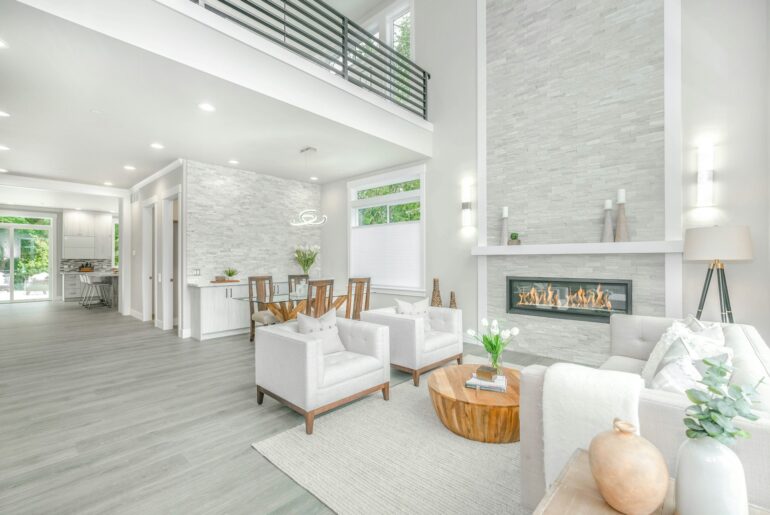This article may contain references to products or services from one or more of our advertisers or partners. We may receive compensation when you click on links to those products or services. Nonetheless, our opinions are our own.
The information presented in this article is accurate to the best of our knowledge at the time of publication. However, information is subject to change, and no guarantees are made about the continued accuracy or completeness of this content after its publication date.
When people think about buying a high-end home, they often picture a huge estate with lots of luxury features and a beautiful design that screams elegance. You might think that spending a million dollars on your dream home will make you rich, but that’s not always the case. A million dollars doesn’t always go as far as you might think in today’s real estate market, especially in areas that are in high demand. Before you start looking for luxury real estate, you need to know how much it really costs, whether you’re shopping in big cities or wealthy suburbs. It will help you understand what to expect, the hidden costs, and how to find your way around the world of luxury homes when you have a million-dollar budget.
- The High-End Market
- What Else Matters?
- The Hidden Costs of High-End Living
- Financing High-End Homes
- Case Studies from Various Cities
- What to Do Instead?
- When to Compromise and When to Hold Your Ground
- Conclusion
- Frequently Asked Questions
- What does it mean when a million dollars mostly falls short in the high-end home market?
- What should buyers consider when preparing to purchase a high-end home?
- What are some common misconceptions about buying high-end homes?
- How can buyers effectively compete in a crowded high-end real estate market?
- What are some trends influencing high-end home prices today?
- What tips can help buyers maximize their budget when looking for a luxury home?
- Is it worth considering homes that are slightly above the initial budget?
- How should buyers prepare emotionally and financially for the high-end home buying process?
- Recommended Reads
The High-End Market
It’s easy to assume that a million dollars will get you a luxurious home with all the bells and whistles, but the high-end market is more nuanced than just hitting that magic number. Real estate prices can vary dramatically depending on location, amenities, and market conditions.
Geographical Differences
For instance, in cities like San Francisco or New York, a million dollars might barely buy you a one-bedroom condo in a desirable neighborhood. In contrast, places like Portland or Nashville could offer you a spacious four-bedroom home with a yard. So, when shopping for a luxury home, the location plays a crucial role in what you can expect for your budget.
What Else Matters?
Beyond the price, what truly makes a house “high-end”? It’s not just the dollar amount on the listing, but the combination of factors that elevate a home to luxury status. Here are some of the key features that can add value:
| Feature | Impact on Value |
|---|---|
| Location | Homes in prime locations with scenic views or proximity to city centers typically command higher prices. |
| Size and Layout | Open floor plans, spacious designs, and higher ceilings make a home more attractive to luxury buyers. |
| Luxury Amenities | Pools, gourmet kitchens, home theaters, and smart home features add to a property’s desirability. |
| Curb Appeal | A well-maintained exterior and landscaping are essential for making a strong first impression. |
These elements can greatly affect the overall price and desirability of a property. Luxury homes often include unique architectural designs and top-of-the-line finishes that set them apart from standard properties.
When shopping for a high-end home, it’s important to look beyond the asking price. There are numerous hidden costs that can make purchasing a luxury property more expensive than anticipated.
Property Taxes
High-end homes come with high property taxes. In certain areas, property taxes can be a significant annual expense, sometimes reaching tens of thousands of dollars.
Homeowners Association Fees
Luxury communities often have HOA fees that can add a hefty sum to your monthly expenses. These fees cover the maintenance of common areas and amenities but can sometimes be unexpectedly high.
Maintenance Costs
Larger homes with expansive yards or intricate designs require regular maintenance. This might include lawn care, pool maintenance, or more frequent repairs due to the higher quality of materials used in luxury homes.
Insurance
The cost to insure a high-end home is typically higher than average due to the increased value of the property and its contents.
Financing High-End Homes
Even with a million-dollar budget, securing financing for a luxury home is not always straightforward. While you may have the funds, lenders often have stricter requirements when it comes to high-value homes.
Lender Requirements
Lenders will closely examine your income, credit score, and debt-to-income ratio before approving a loan for a luxury property. You’ll need to meet these stringent criteria to secure financing.
Down Payment
You should expect to put down a large amount of money, usually at least 20%. For a million-dollar home, this could mean a $200,000 down payment, which could quickly use up your savings.
Voted "Best Overall Budgeting App" by Forbes and WSJ
Monarch Money helps you budget, track spending, set goals, and plan your financial future—all in one app.
Get 50% OFF your first year with code MONARCHVIP
Case Studies from Various Cities
To illustrate just how different the real estate landscape is across the country, let’s look at what a million dollars buys in several important cities.
| City | What a Million Buys |
|---|---|
| San Francisco | A one-bedroom condo in a high-rise with stunning bay views. |
| New York City | A small studio in Manhattan or a two-bedroom in Brooklyn. |
| Miami | A stylish beachfront apartment with access to luxury amenities. |
| Atlanta | A spacious four-bedroom home with a yard, perfect for families. |
| Houston | A sprawling ranch-style home on a large plot of land. |
As these case studies show, the value of a million dollars in real estate can vary drastically depending on the city and its market conditions.
What to Do Instead?
Don’t worry if a million dollars doesn’t quite get you what you wanted. Smart buyers know how to make their money go further.
Explore Emerging Neighborhoods
Areas that are undergoing revitalization often offer more affordable options that still have great potential. These neighborhoods may be up-and-coming but offer plenty of promise for future growth.
Consider New Builds
Newly constructed homes often feature modern designs and energy-efficient technologies. They may also come with warranties for appliances, which can save you money in the long run.
Look for Fixer-Uppers
While buying a home that needs some work can be daunting, it’s a great way to get a property at a lower price and customize it to your tastes. With some investment and effort, you could turn a fixer-upper into your dream home.
When to Compromise and When to Hold Your Ground
Buying a high-end home doesn’t mean you have to settle for everything you want or be forced to sacrifice your needs. Finding balance is important.
Compromise on Size
If location is a priority, you may need to settle for a smaller home or less square footage. A smaller home in a desirable neighborhood might be a better long-term investment.
Upgrade Over Time
It’s okay if your dream home isn’t perfect right away. Consider buying a home and upgrading it gradually as you save more money. This can give you a chance to enjoy the property while making improvements over time.
Location vs. Spaciousness
Sometimes, the yard or additional space isn’t worth sacrificing your commute. Be realistic about what you truly need versus what you want.
Conclusion
In today’s market, you need more than just a million dollars to buy a high-end home. Because prices are different in different areas and there are hidden costs, buyers need to change their expectations and plan their approach. You can make your dream home a reality without going overboard with your money by looking into different locations and options like fixer-uppers. Buying a luxury home isn’t just about spending a lot of money; it’s also about making smart investments. The right home should meet your needs, fit your budget, and give you a comfortable place to live for a long time. As you start looking for a new home, make sure you stay informed, realistic, and open-minded. You might be closer to your million-dollar dream home than you think.
Frequently Asked Questions
What does it mean when a million dollars mostly falls short in the high-end home market?
A million dollars often doesn’t stretch as far as expected, especially in high-demand urban areas or affluent suburbs. In some regions, the cost of luxury homes is rising rapidly, so buyers may need to adjust expectations or consider alternative options.
What should buyers consider when preparing to purchase a high-end home?
Buyers should research local markets, understand the neighborhoods they are interested in, and evaluate their personal needs and lifestyle. Working with a knowledgeable real estate agent can provide insights and help navigate the complexities of the high-end market.
What are some common misconceptions about buying high-end homes?
Many buyers assume that a budget of one million dollars guarantees a luxurious, move-in-ready home. But the reality is that high-end properties often exceed this price, particularly in sought-after locations. Buyers should be prepared for potential compromises or a higher budget.
How can buyers effectively compete in a crowded high-end real estate market?
To stand out, buyers should secure pre-approval for financing, act quickly when they find a property, and present themselves as serious, committed buyers. Knowing local market trends and being prepared to make competitive offers can also set buyers apart.
What are some trends influencing high-end home prices today?
Trends such as the rise of remote work, demand for larger homes with dedicated office spaces, interest in outdoor amenities like pools, and a preference for eco-friendly features are driving up prices in high-end markets.
What tips can help buyers maximize their budget when looking for a luxury home?
Buyers can maximize their budget by considering up-and-coming neighborhoods, properties that may need renovations, or off-market listings. Working with a skilled real estate agent can uncover opportunities to stretch the budget further.
Is it worth considering homes that are slightly above the initial budget?
Yes, properties slightly above your budget may offer better value, unique features, or a prime location that could appreciate significantly over time. A well-chosen home can be a solid investment in the long term.
How should buyers prepare emotionally and financially for the high-end home buying process?
Buyers should know exactly how much money they need to spend, including all the costs that come with it, and be ready for any problems that might come up. It’s important to be open-minded and flexible, especially when the market is competitive.

Reviewed and edited by Albert Fang.
See a typo or want to suggest an edit/revision to the content? Use the contact us form to provide feedback.
At FangWallet, we value editorial integrity and open collaboration in curating quality content for readers to enjoy. Much appreciated for the assist.
Did you like our article and find it insightful? We encourage sharing the article link with family and friends to benefit as well - better yet, sharing on social media. Thank you for the support! 🍉
Article Title: Why a Million Dollars May Not Be Enough for a Luxury Home
https://fangwallet.com/2025/11/15/why-a-million-dollars-may-not-be-enough-for-a-luxury-home/The FangWallet Promise
FangWallet is an editorially independent resource - founded on breaking down challenging financial concepts for anyone to understand since 2014. While we adhere to editorial integrity, note that this post may contain references to products from our partners.
The FangWallet promise is always to have your best interest in mind and be transparent and honest about the financial picture.
Become an Insider

Subscribe to get a free daily budget planner printable to help get your money on track!
Make passive money the right way. No spam.
Editorial Disclaimer: The editorial content on this page is not provided by any of the companies mentioned. The opinions expressed here are the author's alone.
The content of this website is for informational purposes only and does not represent investment advice, or an offer or solicitation to buy or sell any security, investment, or product. Investors are encouraged to do their own due diligence, and, if necessary, consult professional advising before making any investment decisions. Investing involves a high degree of risk, and financial losses may occur including the potential loss of principal.
Source Citation References:
+ Inspo
There are no additional citations or references to note for this article at this time.











































